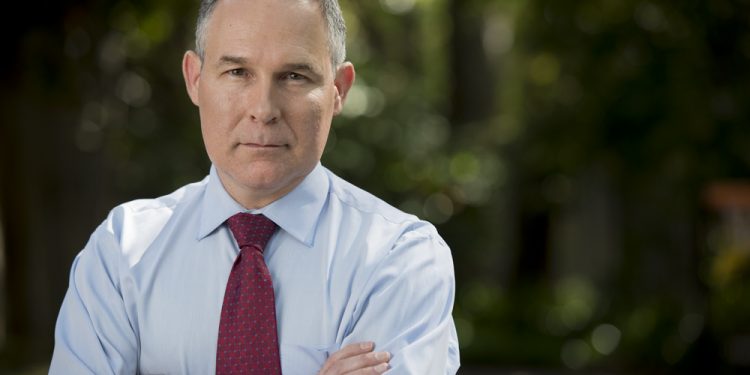Former White House Counsel C. Boyden Gray has plenty of experience w/ the intersection of government & the environment and he writes in The Washington Examiner why Scott Pruitt is the right person to lead the EPA:
December 30, 2016
Former White House Counsel C. Boyden Gray has plenty of experience w/ the intersection of government & the environment and he writes in The Washington Examiner today why Scott Pruitt is the right person to lead the EPA:
C. Boyden Gray
When Oklahoma Attorney General Scott Pruitt is confirmed as the next administrator of the Environmental Protection Agency, he will inherit an agency that should be declaring victory in its 46-year battle for a cleaner, healthier environment. The next administrator must focus on reining in an agency that has far exceeded its original mission. Fortunately, Pruitt understands the EPA’s proper role and is the right man for the job.
We have come a long way since the days when, as a federal judge once
described, “the air in the Los Angeles basin was so thick with smog that a mountain, or even a nearby mountain range, could simply disappear.” That’s what the Clean Air Act was designed to remedy, and it has worked.
That’s not the case in every nation.
In recent days, Paris’ smog was so thick that French authorities banned cars with even or odd-numbered license plates from the streets on alternating days — the fourth time in 20 years the city has taken such drastic measures to reduce emissions. London and Madrid air quality monitors are also reporting
dangerous levels of pollution. Beijing is
worse.
The United States, by contrast, has the cleanest air and water in the world, due in large part to Republican efforts, from the creation of the EPA during President Nixon’s tenure to the sweeping 1990 Clean Air Act Amendments signed by President George H.W. Bush.
We no longer contend with the large-scale environmental crises that still plague the rest of the world. But you’d never know it, judging by the actions of President Obama’s EPA.
Instead of sensibly enforcing laws and regulations already on the books, EPA rulemaking has consciously and conspicuously overreached into nooks and crannies of American commerce it was never meant to go. As the same federal judge observed, “Congress never intended the [Clean Air] Act to serve as an environmental cure-all.” But because the “environment” touches everything, EPA believes it must touch everything as well.
There is no problem too small or too local for EPA to ignore, and no statutory term it will not twist into a justification for action. Just take the
EPA’s expansive definition of “waters of the United States,” by which the agency enlarged its jurisdiction over “navigable waters” under the Clean Water Act to embrace tiny creeks and even dry land that is expected to flood later. Such unbounded interpretations have often left representative government on the dock waving goodbye, as
Justice Scalia put it, while the “EPA embarks on a multiyear voyage of discovery.”
Bureaucracy, by its nature, metastasizes, and the EPA has grown larger while its contribution to public health is getting smaller and smaller. As American industry and transportation have become ever
cleaner and more efficient, incremental improvements in environmental quality become increasingly costly. It’s cheap to achieve emissions reductions from a primitive factory with no existing protections, but it’s terribly costly to reduce one last bit of pollution from a smokestack already laboring under state-of-the-art controls. Pruitt understands these principles and will act on them.
His detractors have responded to his nomination by peddling fear, trying to scare people about the “nasty environmental consequences” of a deregulatory agenda at EPA. Paul Krugman disparagingly writes that Pruitt will “
make America gasp again.” But the environmental gains the country has achieved over the past half century are here to stay: No EPA administrator could dismantle them. Among other reasons, the capital investments required to achieve them are sunk costs that cannot be undone.
As administrator, Pruitt should require EPA employees to investigate whether the negligible benefits the agency has recently pursued are worth the cost. In some instances, a deregulatory agenda will help the environment as much as the economy. For example, renewed focus on market incentives rather than command-and-control solutions would boost environmental yields while reducing regulatory drag on the economy, as illustrated by the success of the agency’s 1990 acid rain program.
Pruitt has an opportunity to substitute economic reality for the creative math EPA uses to justify its new rules.
When Pruitt takes over, he will have his work cut out for him. Past Republican EPA administrators have had to battle their own agency’s staff to put sound scientific, economic and legal analysis above the bureaucracy’s institutional anti-business culture. But Pruitt has demonstrated that he can hold his own against an intransigent bureaucracy including, more than once, the EPA itself. The country needs an EPA administrator like Pruitt who will appropriately restrain an agency that for too long has shackled American industry.
C. Boyden Gray was White House Counsel during the George H.W. Bush administration and served as United States Ambassador to the European Union from 2006-2007. He was one of the architects of the 1990 Clean Air Act.

